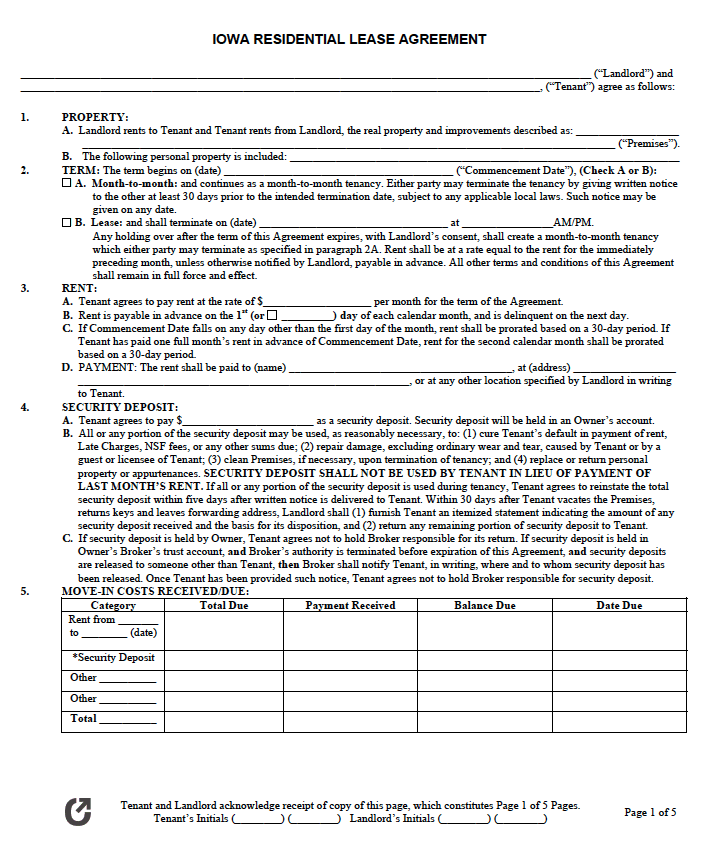Iowa Rental Lease Agreement Templates
The Iowa Rental Lease Agreements are formed between property owners/managers and tenants for the purpose of locking in the tenant’s obligation to pay rent for a set time. Without rental agreements, landlords would be at constant risk for tenants moving out, which would make planning and budgeting significantly more difficult. Additionally, rental contracts allow landlords to set binding rules regarding the property, helping to ensure rent is paid on time and the units are kept from damage.
Types (7)
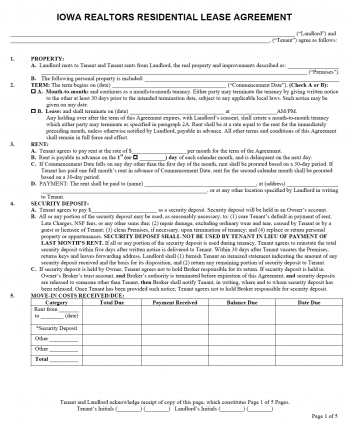 Association of Realtors Residential Lease Agreement – A document created by the Iowa Association of Realtors that can be used as either a standard one (1) year lease or as a non-terminating month-to-month contract.
Association of Realtors Residential Lease Agreement – A document created by the Iowa Association of Realtors that can be used as either a standard one (1) year lease or as a non-terminating month-to-month contract.
Download – Adobe PDF
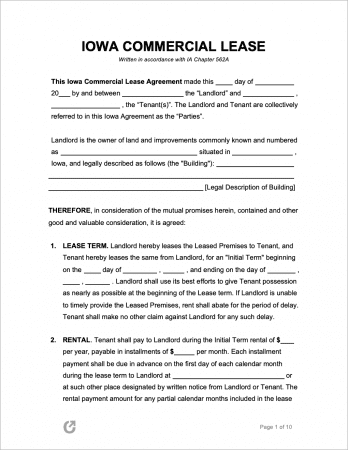 Commercial Lease Agreement – Outlines the rights and responsibilities of a landlord leasing a property to a business owner for one (1) to five (5) years.
Commercial Lease Agreement – Outlines the rights and responsibilities of a landlord leasing a property to a business owner for one (1) to five (5) years.
Download – Adobe PDF, Word (.docx)
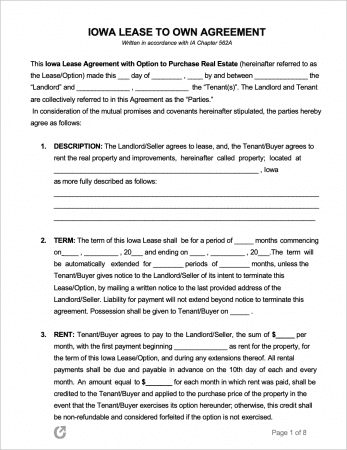 Lease to Own Agreement – A special type of lease agreement that combines elements from purchase agreements and standard leases. Gives tenants the option to purchase a rental property upon the lease’s expiration.
Lease to Own Agreement – A special type of lease agreement that combines elements from purchase agreements and standard leases. Gives tenants the option to purchase a rental property upon the lease’s expiration.
Download – Adobe PDF, Word (.docx)
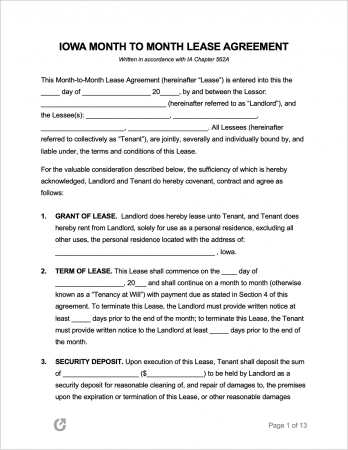 Month-to-Month Rental Agreement – Used by landlords that don’t want to (or cannot) lease a property for one (1) year. An ongoing agreement that can be canceled with notice of only thirty (30) days by either party.
Month-to-Month Rental Agreement – Used by landlords that don’t want to (or cannot) lease a property for one (1) year. An ongoing agreement that can be canceled with notice of only thirty (30) days by either party.
Download – Adobe PDF, Word (.docx)
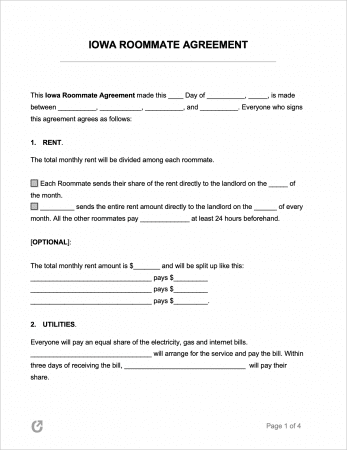 Roommate Agreement – Contains topics relating to day-to-day living among roommates sharing the same rental property.
Roommate Agreement – Contains topics relating to day-to-day living among roommates sharing the same rental property.
Download – Adobe PDF, Word (.docx)
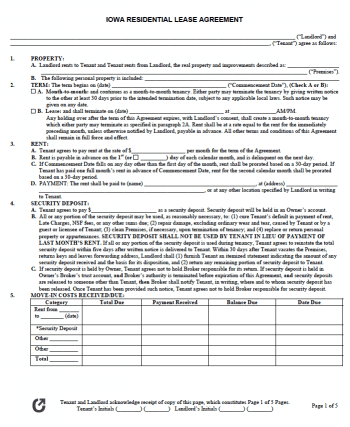 Standard Residential Lease Agreement – Used for leasing rental dwellings on a year-to-year basis. Complies with all Iowa landlord-tenant laws.
Standard Residential Lease Agreement – Used for leasing rental dwellings on a year-to-year basis. Complies with all Iowa landlord-tenant laws.
Download – Adobe PDF, Word (.docx)
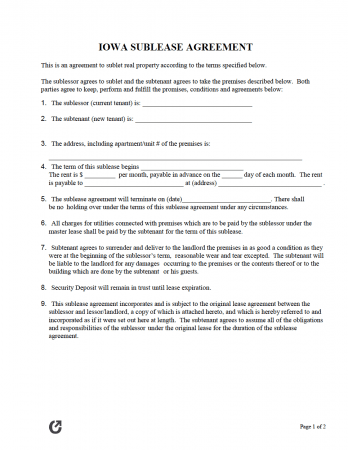 Sublease Agreement – So long the landlord permits it, a tenant can use the form to rent out a leased property for all (or a portion of) of the lease.
Sublease Agreement – So long the landlord permits it, a tenant can use the form to rent out a leased property for all (or a portion of) of the lease.
Download – Adobe PDF, Word (.docx)
What is an Iowa Lease Agreement?
An Iowa Lease Agreement is a legally binding contract used by property managers and real estate owners for the purpose of forming rules and responsibilities regarding the renting. Once a landlord finds a tenant to lease their property, they should use a rental application to ensure the tenant has had positive renting experiences and has a history of making timely payments.
State Laws & Guides
Laws: Ch. 562A Uniform Residential Landlord and Tenant Law.pdf
Landlord-Tenant Guides / Handbooks
- Legislative Services Agency – “Landlord-Tenant Law” [Guide].pdf
- Home, Inc – “Rental Handbook for Landlords and Tenants”.pdf
When is Rent Due?
Per § 562A.9(3), unless there are terms to the contrary in the lease, rent will need to be paid in equal monthly installments at the start of every month. For terms of one (1) month or less, rent is payable at the beginning of the lease term. There is no state statute governing grace periods.
Landlord’s Access
Emergencies (§ 562A.19 A(2)): So long the situation is an emergency, landlords can enter occupied units without notice.
Non-Emergency (§ 562A.19 A(3)): Unless it is impractical to do so, landlords must give tenants one (1) days’ notice of their intent to enter. Entrance may only be made at reasonable times (standard business hours).
Landlord’s Duties
In accordance with § 562A.15, landlords are required to uphold the following:
- Comply with any and all building and housing code requirements that relate to health and safety.
- Maintain the rental dwelling in a fit and habitable condition by making any necessary repairs.
- Maintain common areas and keep them in a clean and safe condition. Note: if a tenant were to place an object or material in a common area and proceed to hurt themselves from said object, landlords are not liable for resulting injuries.
- Keep all provided systems and appliances in safe and working order.
- Ensure tenants have easy access to garbage containers and/or trash disposal services.
- Provide that tenants have a constant supply of running water, reasonable amounts of hot water, and heating (unless not required by law to have heat or a utility controlled by the tenant).
Tenant’s Duties
Section 562A.17 states tenants have the following obligations (not including those found in the lease agreement):
- Abide by tenant-specific building and housing codes that relate to health and safety.
- Keep their rental unit clean and safe.
- Throw away garbage/trash/rubbish in a safe manner.
- Maintain all fixtures, appliances, and systems as is reasonable.
- Use provided services, appliances, and utilities in a manner they are meant to be used.
- Cannot damage, visually alter, or impair any part of the premises (or allow another person to do so).
- Do not disturb a neighbor’s right to the peaceful enjoyment of their rental.
Required Disclosures
- Environmental Liability (§ 562A.13(6)) The landlord or person acting on their behalf must disclose in writing if the property is “listed in the comprehensive environmental response compensation and liability information system maintained by the federal environmental protection agency.” The disclosure must take place before the commencement of the lease.
- Lead Paint Disclosure: Landlords must disclose to tenants of any known lead paint hazards if the rented dwelling was built prior to 1978. Moreover, they must provide this pamphlet to tenants that discusses the matter.
- Names and Addresses (§ 562A.13): The landlord or a party they have granted the authority to act on their behalf are required to record their name and address in writing and provide this to the tenant at or before the commencement of the tenancy.
- Utility Rates (§ 562A.13(4)): Before the parties sign the lease, the landlord (or the party that acts on their behalf) must fully explain utility rates, charges, and services to prospective tenants. If the tenant pays for utility services directly to the utility company, this explanation does not need to occur.
Security Deposits
Maximum (§ 562A.12(1)): The maximum deposit a landlord may demand is two months’ rent.
Returning to Tenant (§ 562A.12(3)(a)): Landlords are required to give back the security deposit within thirty (30) days from the date the tenancy is terminated. If for any reason the landlord will not return the full deposit, they must explain their reasoning to the tenant in a written statement.
Deposit Interest (§ 562A.12(2)): For the first five (5) years of a tenancy, the landlord can keep all interest generated from security deposits. After that time, it must be paid to the tenant.
Uses of the Deposit (§ 562A.12(3a)): Landlords can apply security deposits towards the following:
- To make up for any unpaid rent (or other landlord-owed expenses per the lease),
- To return the rental unit to the condition it was in at the start of the lease (does not include normal wear and tear), and
- To recover costs that resulted from the landlord taking possession of the rental unit after the tenant did not act in accordance with the rental agreement.
